1930 Fundamental Principles of Communist Production and Distribution (1) [GIC]
See also Mattick’s Introduction (1970)
In Place of a Preface
The following work, the fruit of a collective study by the Group of International Communists reveals in its structure such a strongly integrated unity of content that it is possible to speak here of a really positive collective effort. The adoption of the collective method of work in drafting the text, which proves in practice what results can be achieved by a consciously motivated group, is just one of it’s qualities which is of such great and enduring value.
With this work the Group of International Communists have put forward for debate, for the first time in the post-war history of the working class movement, the practical possibility of ordering social production and distribution on the basis of a use-value economy. They have brought together all the experience accumulated as a result of earlier attempts, by theoretical representatives of the working class of a previous era, to solve this most ultimate and conclusive of all areas of the revolutionary theory of the proletariat, in order that the root causes which in the final outcome render all those earlier efforts scientifically untenable may be laid bare and so prevented from generating further confusion.
On the other hand, taking as it’s starting-point the established principles of scientific communism and combining these with such of the work of previous authors as has been to any degree positive, the work simultaneously reveals new social relations and economic interconnections which in their totality establish the economics of communism upon a firm scientific foundation. It concerns itself not only with the necessity for economic transformation and construction in the sphere of industry, but also reveals the necessary links with the agricultural economy. In this way the authors provide a clear insight into the internal interconnections and the law-given mode of development characteristic of the entire economic organism of the growing communist society.
The simple language and the clear methods of analysis employed, which are understandable to every class-conscious worker, ensure that every revolutionary who diligently studies the following pages can also fully grasp their content. The clarity and disciplined objectivity of the writing likewise open up the possibility of a broad arena of discussion within the working class movement, one which can draw into its orbit all the varied schools of opinion represented within its ranks. Since we Council Communists also, within our own ranks, must subject the possibilities projected here to the most thoroughgoing discussion, we reserve for a latter date the final expression of our standpoint towards the exposition which follows.
There is one wish, however, which we would like to extend to this text to help it on its way: the work Fundamental Principles of Communist Production and Distribution will have proved it’s success finally and for all time when all revolutionary workers have consciously read through its pages and brought the accumulated experience contained therein into practical application in the struggle for the victory of the proletarian cause, the victory of communism! The struggle is hard, but the final goal is worthy of it!
Berlin, 1930
GENERAL WORKERS’ UNION
REVOLUTIONARY FACTORY ORGANISATION OF GERMANY
CHAPTER I : STATE COMMUNISM OR THE ASSOCIATION OF FREE AND EQUAL PRODUCERS
PART 1
State Communism
The attempts made in Russia to construct a communist society have introduced into the field of human practice a sphere which previously could be treated only in theory, at least as far as industrial production was concerned. Russia has attempted to order economic life according to the principles of communism … and in this has failed completely! The fact that wages no longer increase to correspond with the rising productivity of labour (1) provides sufficient evidence of this. A greater degree of productivity achieved by the system of social production brings with it no commensurately greater share in the social product. This indicates that exploitation exists. Henriette Roland-Holst proves that the Russian worker today is a wage-worker. One may try to make light of the matter by referring to the fact that Russia is still an agrarian country in that private ownership of land still exists, and that because of this the very basis of wage-labour necessarily imposes itself upon the whole economic foundation of social life. Whoever finds this explanation satisfactory may indeed be perceiving the economic foundations of present-day Russia in an objectively correct light, but in respect of the gigantic attempts of the Russians to implement a communist economy that person has nevertheless learnt nothing. It is for this reason that doubts have arisen amongst many proletarians concerning the method which is being applied by the Russians, and which it is supposed will lead to the establishment of communism. It is a well-known method, which in a few words may be summed up as follows: the working class expropriates the appropriators and places control over the means of production in the hands of the state, which then proceeds to organise the various branches of industry and places them as a state monopoly at the disposal of society.
In Russia matters developed in such a way that the proletariat was able to take command of the factories and to continue running them under its own management. The Communist Party, as the sovereign wielder of state power, then issued directives according to which the factories were to link together their Workers’ Councils (Soviets) at communal, district and gubernial (county) level, in order to unite the whole of industrial life into one organic unit. In this way the productive apparatus was built up out of the vital energies alive in the working masses. It was an expression of the drive towards communism which lived in the proletariat. All forces were directed towards the centralisation of production. The 3rd Congress of the All-Russian Economic Council took the decision:
« Centralised administration of the peoples’ economy is the most certain means in the possession of the victorious proletariat for achieving the most rapid development of the productive forces throughout the whole country .. It is simultaneously the precondition for the socialist construction of the peoples’ economy and for incorporation of the smaller enterprises into the unified economic structure. Centralisation is the sole means for avoiding any tendency towards a fragmentation of the peoples’ economy. » (2)
In just the same way as, at the commencement of this development, the essential element in the situation lay in the fact that control over the management of industrial production was in the hands of the masses, with an equally inexorable compulsion was it inevitable that at a later stage these powers would be transferred to the central administrative organs. If at first the directorates, communal councils etc. were responsible to the masses of workers, the producers, in the end they became subordinated to the central administration, which directed the whole. At the beginning: responsibility from below; at the end: responsibility from above. It was in this way that in Russia a gigantic concentration of productive forces as no other land on earth had ever attempted was carried through. Woe betide that proletariat which is compelled to struggle against such an apparatus of power!. And in spite of all, this is the reality which has overtaken Russia! There can now be not the slightest doubt: the Russian worker is a wage worker, a worker exploited! These workers must struggle for their wages against the mightiest state apparatus the world has ever known!
The fundamental point to which we would draw attention here is that, in the case of this form of communism, the proletariat has no control over the productive apparatus. In the mere formal sense, it is the owner of the means of production, but it nevertheless has no right of disposal over them. Precisely what proportion of the total social stock of products the producer may receive in return for the work performed is determined by a central administration which, if everything proceeds according to plan, determines this on the basis of statistics. In reality, the decision as to whether or not exploitation should take place is vested in a central authority. Even in the case in which a benevolent administration is in command, which then distributes the products in an equitable way, it remains nevertheless an apparatus which has elevated itself over the producers. The question then becomes one as to whether this state of affairs has come to pass in Russia on account of the special conditions prevailing there, or whether in this case we have a characteristic feature typical of each and every central administration concerned with production and distribution. Should the latter be the case, the possibility of establishing communism would become very problematical indeed.
PART 2
Varying Marxist Opinions
With the single exception of Marx, we find in the case of virtually all writers who have concerned themselves with the organisation of economic life in a communist society the same principles being advocated as those which the Russians have applied in practice. In this, they base themselves upon the well-known dictum of Engels: « The proletariat conquers state power and as its first act proclaims the means of production to be state property. » [3] They then set about the task of centralisation and begin to construct organisations of a similar type to those which the Russians have called into being. Thus for instance write Rudolf Hilferding and Otto Neurath, names which could be extended by a whole series of other ‘experts’ :
« Exactly how, where, in what quantity and by what means new products will be produced out of the existing and man-made means of production .. is decided by the social commissariats of the socialist society at national or local level. It is they who mould with conscious intent the whole of economic life, utilising for this purpose all the instruments at the disposal of organised production and consumption statistics, in accordance with the needs of the communities as they, the social commissariats, have consciously represented and formulated them. » [4]
And Neurath expresses this even more clearly:
« The science of the Socialist economy recognises only one single economic master: society itself, which, without reckoning of profit or loss, without the circulation of any form of money, whether it be precious metals or ‘labour money’ reflecting an economic plan, organises production without the aid of any unit of accounting control and distributes the means of life according to Socialist principles. » [5]
Anyone can see that they both arrive at the same kind of social structure as that erected by the Russians. Even if we assume such structures are actually viable ( a fact which we deny) and that the central administration and the organs of social control would be willing or able to distribute the mass of products in an equitable way in accordance with the accepted differing standards of living – even then, and even if we assume that the myriad economic exchanges involved occur smoothly, the fact would still pertain that the producers have in reality no right of control over the productive apparatus. It becomes not an apparatus of the producers, but one placed over them.
Such a state of affairs can lead to nothing other than the forcible suppression of groups which, for whatever reason, come to adopt a position of opposition over and against the administration. The central economic power is simultaneously the political power. Every oppositional element which, in respect of either political or economic affairs, wishes to arrange matters differently to that willed by the central administration will be suppressed with all the means at the disposal of the all-powerful state apparatus. It is certainly not necessary to give concrete examples of this – they are already familiar enough. In this way the Association of Free and Equal Producers proclaimed by Marx becomes a prison-state such as humanity has never before experienced!
The Russians, no less than all the other theoretical schools, call themselves Marxists and of course proclaim their theory to be true communism. In reality, however, it has nothing to do with Marx. It is bourgeois economics, a capitalist administration and control of production projected in communist terms. The historical perspective’s of the Bolshevik tendency are expressed in the fact that they have observed how, already under capitalism, the production process becomes subject to an ever greater degree of socialisation. The free producer of commodities is hemmed in on every side by trades unions, trusts, etc; production is indeed already « communist!:
« The overcoming of capitalist modes of thought as an incipient social phenomenon presumes the carrying through of an all-embracing process. It is highly likely that Socialism will first of all establish itself as an economic order, so that socialists will first be created through the Socialist order, and not, conversely, the Socialist order through the socialists – a sequence which, furthermore, stands in complete harmony with the basic ideas of Marxism. » [6]
Should it be the case that the economy has become « communist » in this way, it is necessary only that the production relations be transformed in such a way that the means of production become state property, and then :
« …a socially planned regulation of production in accordance with the needs of the community and of each individual takes the place of the anarchy of social production. » [7]
On the basis of this plan-determined control they then construct their system further. In order to bring the plan to completion, it is necessary only to install a new management in charge of the capitalist production apparatus – and communist society is there, ready made!
This perspective of communism, according to which the proletariat only needs to place a new management in charge of production in order that, with the help of statistics, this will then arrange everything for the best in the best of all possible « communist » worlds, derives its basic origin in consciousness from the fact that the type of economist or sociologist, whose brainchild this is, is unable to conceive of the growth of planned production as an aspect of the development of the working masses themselves, but can conceive of it only as a process which they – the economic experts – are called upon to carry through and complete. Not the working masses, but they, the leaders, are destined to guide the bankrupt capitalist system of production into communism. It is they who have the knowledge, they who think, organise and order. The sole role which the masses have to fulfil is to endorse which they in their wisdom have decided. Towering above the mass of working people stand the economic experts and leaders with their science, looked up to in reverence by the masses as the custodians of a temple of social marvels which remains closed to them. Science would then be the possession of the great men, from whom the light of the new society beams out. Needless to say, in this form of society, the producers have no control or administrative power whatever over production, so that the picture thereby painted represents a strange version indeed of Marx’s concept of the Association of Free and Equal Producers.
All plans of this kind bear clearly the birthmarks bestowed on them by the period of history in which they have been born: in this case, the epoch of the development of the mechanical sciences. The productive system is conceived as an intricate mechanism which functions through thousands and tens of thousands of gears and cog-wheels. The various parts of the productive process function integrally with one another in much the same way as do the separate yet interdependent partial functions of a production belt, like those found in a modern factory – for instance, Ford. Here and there stand the controllers of the production apparatus, who control the operation of the machines by means of their statistics.
These mechanical plans have their origin in a fundamental error, namely, the idea that communism is primarily a matter of the ordering of organisational-technical processes. In reality, the fundamental question is an economic one: how the basic relationship between producer and product is to be determined. It is for this reason that we say, in respect of this mechanical conception, that it is necessary to find the foundation which will enable the producers themselves to construct the edifice of production. This act of construction is a process which proceeds from below upwards and not from above downwards. It is a process of concentration which is fulfilled by the producers themselves, and not in such a way as if mana from heaven were to fall upon them from above. If it is our wish to take the experience of the revolution to heart and to follow the guidelines given us by Karl Marx, it is even now possible for us to make appreciable progress along this road.
PART 3
Nationalisation and Socialisation
Although no one has left us with a detailed description of a communist society, the adoption of the viewpoint of Karl Marx, that this new mode of social production would in essence be an Association of Free and Equal Producers, and would come into being quite independently of the theories of Social Democrats, or even communists, seems a reasonable one. It is not the state which is conceived as being the leader and administrator of production and distribution, but far rather it is the producers and consumers themselves to whom these functions would fall.
The reformist school has in the course of years turned this theory completely upside down. The struggle for social reforms and the steady transformation of the various branches of industry into state or municipal enterprises meant for them a steady approach towards communism. Wherever capitalist development had brought any particular branch of production to such a degree of concentration that it could function as a unitary structure under central administration, then this would indicate that it was ripe for nationalisation. Whilst reformist Social Democracy conceived of realising communism through a continuous and gradual process of nationalisation, the revolutionary Bolshevik tendency considered that a revolution was necessary in order to complete the process of nationalisation. Thus the conception of the men from Moscow is based on fundamentally the same theoretical methods as that of the reformists. During and after the revolution those industrial units which have become ripe for nationalisation will be operated through the state, whilst that part of the economy which is not yet sufficiently concentrated will remain in the hands of private capital.
The Russian Revolution proceeded according to this scheme. In the year 1917 the producers in Russia began to expropriate the owning class throughout the whole economy, with the intention of ordering production and distribution according to communist principles. The process of expropriation began from below, to the great discomfiture of those who wished to lead and administer the economy from above. It was in this way that the Russian economic administration returned to their former owners many factories which had been expropriated by the workers, because they were considered not yet sufficiently « mature » for communist administration. The First All-Russian Congress of Economic Councils thereupon decreed the following decision:
« In the sphere of the organisation of production, it is necessary to introduce final measures of nationalisation. It is necessary to move forward from the implementation of nationalisation measures for separate enterprises (so far 304) to the consistent nationalisation of industry as a whole. Nationalisation must not be a matter of occasional expediency, and must be carried out only by the Supreme Council of Peoples’ Commissars, with authorisation by the All-Russian Congress of Economic Councils. »[8]
Here we see quite clearly the difference between nationalisation according to the Social Democratic ideal and the actual communist conception of socialisation.
In this we also see the distinction between industrial enterprises which are considered already ripe for communism and those which are not, a concept of which Marx apparently would never have dreamed. F. Oppenheimer has very correctly observed in the Symposium edited by H. Beck on ‘Methods and Aims of Socialisation’ :
« The illusion gains ground that the Marxist concept of ‘socialisation’ is being promoted step by step through the widespread characterisation of nationalisation or municipalisation of individual industrial enterprises as a form of socialisation. It is for this reason also that an otherwise incomprehensible and mysterious emphasis is placed upon ‘mature enterprises …’. For Marx, however, socialist society can become mature only as a whole. Separate industrial establishments or branches of such establishments can, according to him, just as little become ‘mature’ and ‘ready for socialisation’ as the separate organs of an embryo in the fourth month of pregnancy can become mature and be delivered to lead an independent existence. »[9]
« What then becomes apparent is that this nationalisation can only lead to the construction of state socialism, in which the state emerges as a single vast employer and exploiter. » [10]
The aim however should be not to restrict the energy of the masses, who themselves carry out the process of socialisation, but to incorporate them as living cells into the whole organism of communist economy – a development which, in its turn, becomes possible only if and when the appropriate general economic conditions are present. The creators of use-values are then able themselves to integrate their factories into the overall sphere of social production, and so to determine the basis of the relationship of the producers to the social product.
The only writer who, as far as we know, tries to speak the truth on matters of this kind is the reformist H. Cunow. He says:
« In the last analysis, it is nevertheless Marx’s intention, in opposition to the Cobden School, that a fixed control of the economic process should be applied. Not, however, through the state, but through the unification of the free associations of the socialist society. » [11]
In the section on « The Negation of the State and State Socialism », Cunow shows us how German Social Democracy came to desert this standpoint only gradually. At the beginning the movement opposed those tendencies which wished to bring large undertakings such as railways and mines under state administration. One example will suffice. On page 340 of the above-mentioned work we read how, in an article, W. Liebknecht expounded the view:
« It is intended gradually to nationalise one industrial enterprise after another. In other words, to replace the private employers with the state, to continue capitalist industry only with a different exploiter .. It (the state) appears as employer in the place of the private employers, and the workers gain nothing from this, although indeed the state has strengthened its power and its means of oppression … The more bourgeois society comes to realise that it cannot defend itself for ever against the tide of socialist ideas, the more do we approach that moment at which state socialism is proclaimed in real earnest, and the last battle which Democracy has to fight out will be waged under the slogan: « Forward to Social Democracy, forward to State Socialism! » [12]
Cunow then demonstrates that this standpoint was already abandoned before 1900, and in 1917 K. Renner declared: « The state will become the lever of socialism » (See: Marxism, War and the International). Cunow is in full agreement with this, but it remains to his credit that he makes it fully clear that all this has nothing to do with Marx. Cunow makes it a matter of complaint against Marx that he made so sharp a distinction between state and society, which in his view does not exist, or at least is no longer a valid concept.
With their practice of nationalisation according to ‘mature’ industrial enterprises, such as has been implemented in Russia, the Bolsheviks have in reality given Marxism a slap in the face. Indeed, they have thereby transfered their allegiance to the social-democratic concept of the identity of state and society. In Russia, this practice is already making its results felt in the most oppressive way. Society does not hold control over the means of production and the production process. These are in the hands of the ruling clique, which appoints and administers everything « in the name of society » (Engels) … . That is to say, they are in the position to suppress by hitherto unprecedented means each and every group or individual attempting to oppose the new form of exploitation. Russia, which should have been an example of communism, has by this means developed into the ideal of the social-democratic future.
We have dwelt at somewhat greater length upon this type of nationalisation in order to show that this has nothing in common with Marx, and that Marxism is in fact compromised thereby. It was especially after the experience of the Paris Commune that the view began to gain ground with Marx that the organisation of the economy could not be realised through the state but only through a combination of the Free Associations of the Socialist society. With the discovery of the precise forms by means of which the proletariat organises itself for revolutionary class struggle, for the conquest of economic and political power – the Workers’ Councils – the historical foundations on the basis of which the society of freely associating producers must be historically constructed are brought to light and fully revealed for all to perceive and comprehend.
PART 4
The Average Social Hour of Labour
Marx therefore took his stand upon the concept of the « Association of Free and Equal Producers ». This Association, however, has nothing in the least to do with the vague concepts of ‘mutual aid’ which are currently circulating, but has a very material basis. That basis is the computation of the labour-time which is necessary in order to produce use-values. As will be demonstrated in the course of this text, this has nothing to do with value. That this was also consistent with Engels’ viewpoint can be seen from the following:
« Society will be able to calculate in a simple way how many hours of labour are contained in a steam engine, a bushel of the last crop of wheat, or a hundred square yards of cloth of a specific quality. It could therefore never occur to it to go expressing the quantities of labour put into the products, quantities which it will then know directly and absolutely, in yet a third product, in a measure which, moreover, is only relative, fluctuating and inadequate, though it was formerly unavoidable as an expedient, rather than express them in their natural, adequate and absolute measure: time. » (13)
Marx also very clearly indicates the labour-hour as the unit of computation. In his well-known discussion of « Robinson on his Island » he says of this island inhabitant:
« Necessity itself compels him to divide his time with precision between his different functions. Whether one function occupies a greater space of his total activity than another depends on the magnitude of the difficulties to be overcome in attaining the useful effect aimed at. Our friend Robinson Crusoe learns this by experience, and having saved a watch, ledger, ink and pen from the shipwreck, he soon begins, like a good Englishman, to keep a set of books. His stock-book contains a catalogue of the various objects he possesses, of the various operations necessary for their production, and finally, of the labour-time that specific quantities of these products have on average cost him. All the relations between Robinson and these objects that form his self-created wealth are here so simple and transparent that even Mr Sedley Taylor could understand them. » (14)
« Let us finally imagine, for a change, an association of free men, working with the means of production held in common, and expending their many different forms of labour-power in full self-awareness as one single social labour force. All the characteristics of Robinson’s labour are represented, but with the difference that they are social instead of individual. » (15)
We see here that Marx, in his « Association of Freely Associating Producers », conceives in exactly the same way of a computation of labour-time, and indeed on the selfsame basis of the labour-hour. Where, however, Marx has set his freely associating producers in place of Robinson, we now see that we can just as readily place the system of social book-keeping which communism places at society’s disposal, to arrive at the following paraphrase of Marx’s text:
« Its stock-book contains a catalogue of the useful objects it possesses, of the various operations necessary for their production, and finally, of the labour-time that specific quantities of these products have on average cost it. All the relations between the members of society and the objects that form their self-created wealth are here so simple and transparent that anyone could understand them. »
Marx assumes this system of social book-keeping to be in general applicable to a production process in which labour is social; that is to say, it is equally applicable whether communism is still at an early stage of its development, or whether the principle « From each according to his abilities, to each according to his needs » (the higher stage of communism) has already been achieved. In other words: the organisation of economic life may in the course of the various periods of development move through various stages, but the stable basis for all of them nevertheless remains the unit of average social labour-time.
That Marx did indeed understand the matter thus is for instance apparent from the fact that he is at pains to demonstrate with special emphasis that distribution can assume various forms. Neurath infers from this that Marx has posed the question in such a way as to suggest that we have a free choice as to how the products are to be distributed. A strange error indeed for such a « Marx expert » who surely must know that Marx knows nothing of freedom in this matter, but only of functionally derived organic necessity. Freedom of choice in respect of a system of distribution is circumscribed within the limits set by the structure imposed through the system of production. Nevertheless, this is subject to certain modifications which will be discussed later.
« All Robinson’s products were exclusively the result of his own personal labour and they were therefore directly objects of utility for him personally. The total product of our imagined association is a social product. One part of this product serves as fresh means of production and remains social. But another part is consumed by members of the association as means of subsistence. This part must therefore be divided amongst them. The way this division is made will vary with the particular kind of social organisation of production and the corresponding level of social development attained by the producers. » (16)
If, taking this as his basis, Marx was very well able to provide the fundamental category determining, in a communist society, the method of economic regulation and accounting control applicable in the sphere of production, in the case of the sphere of distribution he demonstrates this purely by way of example. Thus he writes further:
« We shall assume, but only for the sake of a parallel with the production of commodities, that the share of each individual producer in the means of subsistence is determined by his labour-time. Labour-time would in that case play a double part. Its apportionment in accordance with a definite social plan maintains the correct proportion between the different functions of labour and the various needs of the associations. On the other hand, labour-time also serves as a measure of the part taken by each individual in the common labour, and of this share in the part of the total product destined for individual consumption. The social relations of the individual producers, both toward their labour and the products of their labour, are here transparent in their simplicity, in production as well as in distribution. » (17)
Marx also reveals elsewhere in his text that he conceives labour-time to be the basic category of the communist economy :
« With collective production, money-capital is completely dispensed with. The society distributes labour-power and means of production between the various branches of industry. There is no reason why the producers should not receive paper tokens permitting them to withdraw an amount corresponding to their labour time from the social consumption stocks. But these tokens are not money. They do not circulate. » (18)
If it is individual labour-time which is to serve as the measure for the product to be individually consumed, then the mass of products must also be measured according to the same yardstick. In other words, the products must have impressed upon them how much human labour-power, measured in time, how many average social hours of labour, they contain. This assumes, however, that the other categories of production (means of production, raw and auxilary materials, etc.) have been measured according to the same scale, so that the entire system of accounting control for production in the seperate industrial establishments must be based upon the average social hour of labour. Then one can with all justice declare: « The social relations of human beings towards one another, both as regards their labour and the products of their labour, remain here simple and clearly understood, in production as well as in distribution. »
Thus we can see that Neurath is in error when he assumes that production and distribution have so little connection with one another that we can have « free choice ». Quite the contrary! If Marx adopts individual labour-time as the measure determining the individual’s share in the product, then by this means he simultaneously lays the basis for the relationship between producer and product, according to which the foundations of production are also determined.
Let us now return to the question as to whether or not a system of planned use-value production, such as would be expressed in an organically integrated economic apparatus, of necessity must lead to a system which raises itself as an alien force over the producers. We say: No! In a society in which the relation of the producers to the social product is directly expressed, this danger does not exist. In every other social formation in which this principle does not pertain, the system of production must finally and inevitably develop into an apparatus of oppression.
PART 5
Towards The Association of Free and Equal Producers
In the form of its system of production, humanity has created an organism designed to satisfy the needs of tens of thousands of human beings. In the course of their production, we use up both our own labour-power and the production process itself. Seen from this point of view, the process of production is simultaneously a process of destruction, a process of the using up of resources; nevertheless, through this very process of destruction we continuously create new use-values. That which has been consumed is born again in the same process. Machines, tools, our own labour-power, are simultaneously renewed in this process, are produced anew, or reproduced. It is an unremitting stream of reformed human energy, energy changed from one form into another. Each specific form is crystalised human energy, which we can measure according to the time during which labour is expended inorder to create it.
The same yardstick applies to that part of the production process in which no physical products are created, such as for instance education, the health service, etc. Here also means of production and labour-power are expended, in which cases the product simply takes the form of the instruction received, the care given to the sick, etc. Distribution takes place directly in and through production itself, and the expended energies flow in their new form directly into society. Because of the fact that we are able to measure these energies intime, a fully exact relation between producer and product is established. The relation of each individual producer to each specific social product is in this way rendered wholly and clearly perceivable.
In the case of the organisation of production according to the schemes of Neurath or Hilferding, or as it is implemented in Russia, this relationship is, on the contrary, completely concealed. Here it is a process veiled in mystery, and the producers themselves certainly know even less about it than the state administrators. In this case, therefore, a definite proportion of the social product must be allocated to the producers by a superior authority, and the former must await trustfully that which they are to receive. This is how matters proceed in Russia. Although productivity may rise, although the mass of social products may increase, the producer nevertheless receives no increase in the share – that is to say, exploitation exists.
What should the producers undertake against this? Nothing? Yes indeed, they must take up once again the cause of struggle against the exploiter, against those who hold control over the system of production in their hands! One may attempt to place « better leaders » in power, although this of course does not lead to the removal of the causes of exploitation. In the final analysis, there remains no other road forward than that of reconstructing the entire system of production in such a way that the exact relationship of the producers to the products fashioned by their labour becomes the foundation of the social system of production. In such a system, however, the task of the leaders and adminstators in respect of the allocation of the products is also eliminated. There remains nothing to allocate. The share in the social product is determined directly. Labour-time serves as the measure for determining the proportion of the total product to be individually consumed.
The question as to whether or not the proletariat, in the course of a communist transformation of society, succeeds in establishing this relationship between producer and product is in the final instance a question of social power. It is on this basis, and this basis alone, that planned production is possible. The seperate industrial units, and indeed whole industries, can then be integrated both horizontally and vertically into a single planned whole, whilst all sections compute quite autonomously their share in the total accounting of labour-time used up in its various forms, these being essentially: wear and tear on machinery, consumption of raw and auxillary materials and expenditure of labour. This fundamental ordering and organisation of communist production can, and indeed must, be brought into being by the producers themselves, can indeed be established by them alone. The Association of Free and Equal Producers then becomes an absolute necessity. The system of interlocking relations and mutual interdependence grows from below, precisely because the producers themselves, in their own right, have control over management and administration. Now the necessary scope has been created to allow for the initiative of the producers themselves to be expressed, who are thereby able to create the moving and developing forms needed by social life in all their thousandfold forms. (19)
It is the proletariat itself which lays in place the foundation-stone cementing the basic relationship between producers and the product of their labour. This and this alone is the key question of the proletarian revolution. In just the same way as the feudal serf struggled in the bourgeois revolution for his piece of land and for the full right of disposal over the fruits of his labour, in the same way thew proletariat now struggles for control of the factories and other industrial establishments and for full right of disposal over production – an outcome which is only possible if the fundamental relationship between producer and product has been fought to its final conclusion in a new social legality. The decisive question at issue here is precisely that of the place the proletariat is to win for itself in society; the question as to whether, along with the right to labour in the work-places, the right of disposal over the products of these work-places is also achieved; or, on the contrary, whether the proletariat is once again to be pronounced incapable of discharging responsibility, and leaders, experts and scientists are to be entrusted with that right of disposal. In the final instance, this struggle will be fought out against those who believe that they are destined, after the revolution, to assume responsibility on behalf of the proletariat. It is for this reason that the cooperation of such people is only appropriate if the foundations of communist production have first been laid. It is this basis alone that their skills may work for society, whereas otherwise they can develop only into a new ruling caste.
The so-called ‘dictatorship of the proletariat’ suppresses everything which opposes the ruling administration, until all branches of production have become sufficiently « mature » as to be integrated by their respective supreme management bodies into the general structure of power and administration. In the case of the « Association of Free and Equal Producers », workers’ rule serves the purpose of introducing and carrying through the new system of production, accounting and regulation on the basis of average social labour-time as the general foundation of all production, and in order to create the basis on which the free producers themselves may control production and administer it. In the case of state capitalism, on the other hand, the general conditions are such as will create the strongest machinery of suppression under the control of a central apparatus. In the case of the system of freely associating producers, it functions so as to bring to life and to promote those very forces through which it itself as the function of rule progressively loses power, in order finally to make itself superfluous; workers’ rule works so as to bring about its own demise at the earliest possible historical moment.
Without concerning ourselves further with state capitalism, we should far rather now proceed to examine how it comes about that any ‘reasonable’ person at this present historical juncture may still embrace and adhere to the ‘naive’ conception of Marx (who is supposed to have derived this out of the liberal-anarchist tendencies of his time) [20] which held that the regulation of economic life should come « about not through the state, but through a union of the Free Associations of the Socialist society », and in which the fundamental catergory of economic life should be the average social hour of labour. Indeed, over and above all this, it is necessary to take steps to ensure that this ‘naive’ conception of Marx is shown to be the sole possible foundation upon which communism might be achieved. To pose the question in this way means simultaneously to declare that this conception was not in the first place born behind a writing-desk, but was itself the product of a seething, developing revolutionary life-activity.
So far as it is possible for us to look back upon events in review, we may count three decisive moments which marked our disillusionment with the sychophantic hymns chanted by the ‘communist economists’. The first was the spontaneous development and functioning of the Soviet system; the second the disarming of the Soviets by the Russian state apparatus; and the third and final moment of disillusionment the growth of state-administered production into a new, hitherto unknown form of rule over the whole of society. These facts compelled us to undertake a closer examination, an examination which revealed that state capitalism, in both theory and practice, has absolutely nothing in common with Marxism. At the same time as social life itself, through its definite expression, social practice, has, in the form of the Workers’ Councils, the Soviet system, impelled Marx’s concept of the Association of Free and Equal Producers into the forefront of history, that same social life, with its objective criticism of theory and practice, has simultaneously given the actual power in society to state capitalism.
References
[1] Henriette Roland-Holst: Klassenstrijd (Class Struggle), 1927, p. 270.
[2] A. Goldschmidt: Die Wirtshaftsorganisation Sowjet-Russlands (The Economic Organisation of Soviet Russia), p.43.
[3]. « The proletariat conquers state power and … proclaims the means of production to be state property » (Engels). This is, of course, the well-known quotation from Anti–Duhring (Pt. III: « Socialism », Chap. II: « Theoretical », Foreign Languages Press, Peking, 1976, p.362). It should be noted, however, that in his other great work, The Origin of the Family, Private Property and the State, as quoted in Chapter VII of the present work, Engels gives expression to the opposite view of communism, that adopted by his life-long friend and co-worker, Karl Marx, which defines the social foundation of communism as an « Association of Free and Equal Producers ».
[4] R. Hilferding: Finance Capital, trans. T. Bottomore, p.28.
[5] O. Neurath: Wirtschaftsplan und Naturalrechnung (Economic Plan and Accounting in Kind), p.84.
[6] O. Neurath: ibid., p.83.
[7] F. Engels: Anti-Duhring, Part III; Foreign Languages Press, Peking, 1976; p.361.
[8] A. Goldschmidt: Die Wirtshaftsorganisation Sowjet-Russlands (The Economic Organisation of Soviet Russia), p.42.
[9] F. Oppenheimer, quoted by H. Beck: Sammelbuch tiber ‘Wege und Ziel der Sozialisierung’ (Symposium on ‘Methods and Aims of Socialisation’), pp. 16-17.
[10] A. Pannekoek on « Socialisation » in Die nieuwe Tijd (New Times), 1919, p.534.
[11] H. Cunow: Die marx’sche Geschichts, Gesellschafts und Staatstheorie, Band 1 (The Marxist Theory of History, Society and the State, Vol 1), p.30.
[12] W. Liebknecht: Staatssozialismus und revolutionare Sozialdemokratie (State Socialism and Revolutionary Social Democracy) quoted by H. Cunow in Die marx’sche Geschichts, Gesellschafts und Staatstheorie, Band 1 (The Marxist Theory of History, Society and the State, Vol 1), p.340.
[13] F. Engels: Anti-Duhring, Foreign Languages Press, Peking, 1976, p.402.
[14] K. Marx: Capital, Vol. I, Penguin Books, p.170.
[15] K. Marx: ibid., p.171.
[16] K. Marx: Capital, Vol I, Penguin Books, p.172.
[17] K. Marx: ibid., p.172.
[18] K. Marx: Capital, Vol. II, Pt. III, Chap. XVIII, Penguin Books, p.434.
[19] Paragraph ending: « …who are thereby able to create the moving and developing forms needed by social life in all their thousandfold forms » How clearly the advent of modern computerisation techniques has highlighted the simple practicability of such a system! Indeed, it may be said that, at least as far as the technical basis of control over production is concerned, the era of the computer represents the dawn of the era of communism.
[20] H. Cunow: Die marx’sche Geschichts, Gesellschafts und Staatstheorie, Band 1 (The Marxist Theory of History, Society and the State, Vol 1), p.309.
***
CHAPTER 2: THE PROGRESS ACHIEVED HITHERTO IN DEFINING THE PROBLEM
PART I
The Disciples of Marx
A survey of the literature of socialism or communism, otherwise so rich, shows that only an extremely meagre body of work has been written concerning the economic foundations of that form of society which it is intended should replace capitalism. With Marx we find the classical analysis of the capitalist mode of production, which concludes with the statement that, through the development of the productive forces, humanity has placed before it the choice either to abolish private ownership of the means of production, in order then to continue production on the basis of social ownership, or – to sink into barbarism. This great scientific achievement lifted socialism out of the realm of utopia and placed it on the firm ground of scientific thought. Concerning the economic foundations of communism, however, Marx gave us only a few signposts showing us by what means they could be laid. In this connection it is his Marginal Notes, known as the Critique of the Gotha Programme, which are especially significant. This wish not to treat of the question at any greater length, to give us only a few pointers, does not however represent any kind of fault in the body of Marxist theory, for to have unfolded these questions for full examination would in his time almost certainly have been premature. Such a beginning would almost certainly have ended in utopia, and it was for this reason that Marx himself warned against it. And so this problem has become to some extent a fruit from the tree of forbidden knowledge, and this it has remained to some extent even to this day, in spite of the fact that the Russian Revolution has proved that it is precisely at this historical juncture that it must be solved. [1]
In addition to defining the general foundations of the new system of production, Marx also indicated the method of social regulation and accounting control which would find application in the new society, and which we describe as accounting according to average social labour-time. The precondition for the establishment of the general foundations of communism were that money and the market must completely disappear, and that the disciples of Marx, insofar as they concerned themselves at all with the foundations of communist production, did not proceed any further than this. In communism they saw fundamentally nothing other than a continuation of the concentration of economic resources as we have known this under capitalism, which would then bring communism into being quite spontaneously. This outlook is revealed most clearly in the case of Hilferding, who subjects to examination the consequences of a total concentration of capital in the hands of one single owner. He draws the imaginary picture of a mammoth trust and describes this in the following words:
« The whole of capitalist production would then be consciously regulated by a single body which would determine the volume of production in all branches of industry. Price determination would become a purely nominal matter, involving only the distribution of the total product between the cartel magnates on one side and all the other members of society on the other. Price would then cease to become the outcome of factual relationships into which people have entered, and would become a mere accounting device by which things would be allocated among people. Money would have no role. In fact, it could well disappear completely, since the task to be accomplished would be the allocation of things, not the distribution of values. The illusion of the objective value of the commodity would disappear along with the anarchy of production, and money itself would cease to exist. The cartel would distribute the product. The material elements of production would be reproduced and used in new production. A part of the output would be distributed to the working class and the intellectuals, while the rest would be retained by the cartel to use as it saw fit. This would be a consciously regulated society, but in an antagonistic form. This antagonism, however, would express itself in the sphere of distribution, which itself would be consciously regulated and hence able to dispense with money. In its perfected form finance-capital is thus uprooted from the soil which nourished its beginnings. The circulation of money has become unnecessary, the ceaseless turnover of money has attained its goal in the regulated society, and the perpetuum mobile of circulation finds its ultimate resting place. » [2]
According to this theory, the development towards communism is an unproblematical matter. It is an automatic and contradictionless process, which capitalism itself completes. Capitalist competition leads to the concentration of capital, and by these means large aggregations develop in industry. Within such an aggregation – for instance, a trust which combines transport, mining, rolling mills, etc., in one integrated economic community – a sphere of distribution without money develops. The higher management simply decides to which factory the new means of production (extended reproduction) are to be delivered, what and how much is to be produced, etc. According to this theory the problem of communist production is fundamentally nothing other than the further implementation of this kind of concentration, which then leads to communism quite spontaneously. Private ownership of the means of production will be superseded, for the simple reason it becomes a hindrance to the further combination of industrial establishments. With its elimination the process of concentration can develop to the full and nothing then stands in the way of combining the whole of economic life into one mammoth trust, which is then administered from above. The preconditions which Marx laid down for a communist society would thereby have been fulfilled. The market will have disappeared, because one single concern does not sell to or buy from itself. The prices attached to products also then vanish, whilst the higher administration directs the stream of products from one industrial unit to another, according to what they find to be expedient. That it should ever have been thought necessary to measure how much labour each product embodies was obviously a naive error committed by Marx and Engels.
Thus the course of development taken by the science which concerns itself with the communist economy does not assume the form of a straight line, but takes, after Marx, a different direction , to return to its former classic position only at around 1920. In this connection, it is surely a bitter irony that it was precisely the bourgeois economists who unintentionally helped the science of communism to take a generous step forward in its own development. At a time when it seemed as if the downfall of capitalism was within foreseeable reach and that communism was on the point of taking the world by storm, Max Weber and Ludwig Mises began to develop their criticism of communism. They were of course able to relate that criticism only to the Hilferdingian brand of ‘socialism’ and – what is essentially the same thing – Russian ‘communism’, whilst Neurath , the thoroughgoing disciple of Hilferding, was compelled to suffer the consequences of this. Their criticism concluded by demonstrating that an economy without any means of regulation or accounting control, without a general denominator by means of which to measure the value of products, is an impossibility. And indeed their shot had found the right mark. The result was considerable despondency and confusion in the ‘Marxist’ camp. In the field of economic science the impossibility of communism had been proven, simply on the grounds that, in the case of such an economy, each and every form of planned production would have ceased. Communism, which sought to prove its very right to exist precisely on the basis of the anarchy of capitalist production, showed itself to be even less amenable to a planned mode of operation than capitalism! Block then added his voice by saying their could be no question of communism before it had been demonstrated what means of control was to replace the « market mechanism ». Even Kautsky lost his composure and so arrived at the most non-sensical proposals, such as fixing of prices over long periods, etc. These wild somersaults of Kautsky’s nevertheless has a positive content, in that, through them, the necessity for a system of social regulation and accounting control became recognised, even if Kautsky did then conceive of this coming into being on the basis of present-day money. He believed that money would be indispensable « as a measure of value for book keeping purposes and as a method of keeping account of exchange relations in a socialist society », as well as « a means of circulation » . (K. Kautsky: The Proletarian Revolution and its programme, p.318).
The destructive criticism of communism wrought by Weber and Mises had in reality the effect of helping the study of communist economy over its moment of inertia and to place it on real foundations. It was they who summoned to life those intellectual forces which from that moment on have allowed themselves no further rest, since it was from that moment that it became possible to persue further the Marxist method of thought in relation to the concept of the average social hour of labour.
As an opposite pole to that of state communism, various syndicalist currents began to appear around the year 1910, which sought to continue capitalist production through « syndicates », « industrial unions » or « guilds ». These would then distribute their profits amongst the workers, or profits would be allowed to accumulate in a central social fund. This form of ‘communism’ was never subjected to any theoretical elaboration, unless we can consider as such the work of Otto Leichter entitled Economic Regulation and Control in a Socialist Society which was published in Vienna in 1923. This study is based in general upon the method of social regulation and accounting control founded upon labour-time computation, and is without doubt the best effort hitherto produced in this field. The theory of autonomous economic administration at the hands of the producer-consumers themselves here takes a good stride forwards. In it, the problems are posed quite truthfully, although in our view Leichter fails to develop them to a satisfactory solution. He also declares that, before him, Maurice Bourguin had sought to place the communist economy on the foundation of accounting control on the basis of labour-time expended, and according to Leichter the latter’s methods of thought corresponded almost exactly with his own. There were, in addition, various other Marxist economists who recognised the necessity for accounting control in a communist economy to be effected through labour-hours, although none of these adopted the means of production as a category in their method of accounting. For instance Varga , in Communism, Year 2, issue 9-10, published an article on this theme. Needless to say, because of the above-mentioned error the result is valueless.
It is however not only in the sphere of economic science that progress can be seen in the definition of the problem, but also in the sphere of the political factors. The economic experts consider communism only from the standpoint of production and distribution. The revolutionary proletariat, however, in reality persues other motives. The extent to which state communism is economically viable or not is for it fairly irrelevant. For this reason it too rejects it, because practice has proved that the productive apparatus can be taken into social ownership whilst still continuing to function as an exploitative apparatus. The Russian revolution, for instance, has indeed revealed the problem in this political light.
Were we to enquire as to what positive ideas and conceptions are today in circulation within the revolutionary proletariat concerning the new communist economy, then we would find that the idea of autonomous administration and management is fairly well developed, but that any closer indication as to how this is to be realised is lacking. Nevertheless everyone now believes that it is absolutely necessary to achieve clarity on these matters.
PART 2
Free Communism
The plea for clarity appears very strongly in Muller-Lehning’s pamphlet, Anarcho-syndicalism. He opposes the view that the immediate task is to wreak universal destruction whilst at the same time the task of discovering how society may once again be organised can be left safely to the indefinite future (ibid.; p.4). A programme is necessary to determine « how anarcho-syndicalism may be realised after the revolution has taken place » (ibid.; p.5). It is not enough merely to propagate the economic revolution, « but one must also subject to examination how it is to be carried through » (ibid.; p.6). The Russian anarchists placed the self-initiative of the masses in the foreground, « but the question as to how this initiative was actually to express itself, what the masses were actually to undertake, today and tomorrow – all that remained vague and only slightly positive » (ibid.; p.7). « Many manifestos made their appearance, but to the question of daily practice it was only very few which could give a clear and simple answer » (ibid.; p.8). The following is a quotation from Muller-Lehning’s pamphlet:
« It is necessary to say the Russian Revolution has posed the question once and for all time: what are the practical and economic foundations of a society without a wages system? What is to be done on the day after the revolution? Anarchism will have to answer this question, it will have to take the lesson of the last few years to heart, if total failure is not to find its conclusion in irredeemable bankruptcy. The old anarchist solutions, however much truth they may have contained and however much they may have been chanted in repetition, have solved not a single problem posed by real life. In particular, they do not solve a single one of the problems which the social revolution has placed before the working class. » (Muller-Lehning: Anarcho-Syndicalism, p.10).
« Without these practical realities all propaganda remains negative and all ideals remain utopia. This is the lesson which anarchism has to learn from history, and which – and this cannot be repeated too often – has been proved ever and again through the tragic experience of the Russian Revolution. » (p.11).
« The economic organisations have as their aim the disappropriation of capital and the disarming of the state. It is the productive associations of the workers which must take the place of the organs of capitalism and the state, which must function as the pillars supporting the whole of economic life. The foundation must be the factory, the factory organisations must form the germinal cells for the new economy and social organisation. The entire system of production must be constructed on the basis of the federal organisation of industry and agriculture. » (Muller-Lehning: ibid.; p.18).
« Whoever wishes to see an end to capitalism and state capitalism must replace these realities of social life with other realities and other economic organisations. That can be done only by the producers themselves. And they can do this only collectively, in and through their own organisations. Collectively in the factory, collectively in industry, etc. They must organise themselves in order to administer the means of production through their federalised industrial organisations, and so organise the whole of economic life on an industrial and federal basis. » (Muller-Lehning: ibid.; p.19).
This pamphlet, published in 1927, makes a fundamental advance compared with all others which up till now have appeared as attempting to make a contribution to the clarification of this question. It is not so much that it makes its point in compelling conceptual flourishes, but its great virtue is the fact that it does make the attempt to absorb certain experiences of the Russian revolution and to transform them into weapons for the future class struggle. The vision of a federal structure for economic life has been derived from the first period of the Russian revolution. However, the author demonstrates ad nauseam that this in reality only represented a first attempt to pose a problem, and not a single one of them can he offer a solution.
A French anarchist, Sebastian Faure, attempted to find a solution. His book Universal Happiness, published in 1921, depicts his conception of free communism. The importance of this book lies in the fact that it shows that anarchist conceptions of communist society do not necessarily exclude a system of centralised disposal and control over social production. For a close examination of the Faurian system of ‘free communism’ shows that it is in reality nothing other than vulgar state-communism. Indeed, the book does not bear the character of a scientific examination, but is couched more in the form of a utopian novel in which a « free communist society » is made to grow out of pure fantasy. Nevertheless, the fact that, in opposition to such phrases as « equality for all », « freely concluded agreements » and « the elevating spiritual principle of opposition to the state and state power », a system of production is depicted in which the right of control over production does not lie with the producers themselves clearly demonstrates that, in this particular camp at least, there is absolutely no fear of this particular author giving any evidence whatever of any understanding of the laws of motion applicable to a communist system!
Faure is opposed to power as a « thing in itself », and for that reason he speaks of the hundreds and thousands of threads and links which forcibly bind together against their will all who cooperate in the modern productive apparatus. He writes: « This whole organisation (ie. his system – Ed.) is founded on the inspiring spiritual principle of free cooperation » (p. 213). We however are of the opinion that this cannot be the foundation of any system of production and reproduction. Should the producers wish to make their rights secure, whether with or without the aid of an « inspiring spiritual principle », then the whole organisation must be founded to a far greater degree upon a firm, material basis. The producers must themselves determine in their workplaces the relationship of the producer to the social product. They must calculate how much labour-time is absorbed in each product, for their labour-time is the measure of their share in the social product. Only then can the entire organisation depend, not on some « spiritual » ideal wafting upon the breeze of some abstract principle, but be founded in economic reality.
In the case of the mutual relationship to be established between the producers themselves, we find once again the same vague, vacillating basis expressed through the concept of « free agreements ». Here also there is no clear foundation, no system of time-based regulation and accounting control over the stream of products from factory to factory. But without this material foundation these « free agreements » also remain nothing but empty phrases. « One tries out this, tests the other, combines them and tests the results of the various methods. The resultant unanimity takes form, makes its appeal and pushes through on the strength of its results, and finally triumphs » (p.334). For Faure, this foundation, grounded in freedom for each and achieved through the unanimity of all, is no more than natural. « Is it not so in nature also? The example of nature is there, clear and distinct. Everything there is joined through free and spontaneous mutual accommodations. .. The myriad tiny elements, like grains of dust, seek each other out, attract one another, gather together and form an atom » (p.334).
We would point out in this connection that analogies drawn from nature are always extremely dangerous, and particularly in this special case the Faurian method reveals « clearly and understandably » how wholly inadequate it is. In Faure’s world everything is joined through « free and spontaneous mutual accommodations ». However, what is in fact so wonderful is the way in which, without further thought, the human concept of freedom is transferred to the field of nature. In the realm of « pure metaphor », of course one can escape from any responsibility. In this case Faure overlooks completely the decisive moment at which these « free and spontaneous mutual accommodations » actually arise in nature; that moment is, of course, determined by the mutual relations of forces between the participating members. If the sun and earth conclude a « free and spontaneous agreement » with one another that the earth should revolve around the sun in 365 days, this is amongst other things determined by the mass of the sun and the earth respectively in relation to one another. This is the real material foundation on which their « free mutual accommodation » is concluded.
It is always thus that matters are ordered in nature. Its atoms, or any other form of matter in motion, enter into relations based upon a balance of opposed forces. The exact form of this relationship is determined by the specific nature of the forces at work between the two opposed yet united partners. It is for this reason that we also are pleased to adopt this example from nature, but we do so only in order to demonstrate by these means how an exact relationship of the producer to the product must be present if such a « free and spontaneous mutual accommodation » is to be concluded successfully in the conditions of human society. It is by these means that this agreement is transformed from a mere phrase into reality. Although it is obvious that Faure has never actually concerned himself with economic problems, it soon becomes apparent that he is a representative of the Neurath school, that is to say, a « natural » economist. [3] As we have already seen, this school considers a unit of regulation and accounting control to be absolutely superfluous, and proposes to achieve the same result by means of a production plan drawn up with the help of statistics:
« It is also necessary above all to determine the total demand for, and the quantity of, each separate need. … The communes should then make these needs known to the Central Administration Office responsible for the whole national economy, according to the number of inhabitants, whereby the officials there obtain a survey of the total needs of the ‘nation’. Each commune then produces a second list indicating how much they are able to produce, from which the ‘central administration’ is now able to assess the productive forces of the ‘nation’. The outcome of the process is very clear. The higher officials should now determine which proportion of production is to be allotted to each commune and which proportion of production they may retain for themselves ». (S.Faure: Universal Happiness, pp. 215-6)
This procedure is exactly the same as that conceived by the state communists: down below – the masses; above – the officials, who retain the management and administration of production and distribution in their hands. With such a system, society is not founded on economic reality but is dependent upon the good or bad will of individuals, or upon their administrative ability – something that Faure readily admits. In order that there should be no doubt concerning the need for a central right of control, he adds: « The central administration knows the extent of total production and total demand and must therefore inform each local committee as to how much product it has at its disposal and how much means of production it must produce » (p. 218). In order to be quite clear that all this has nothing to do with any specific kind of free communism, we will compare it with the social-democratic communism [4] described by Hilferding . We will see that the two agree with one another almost word for word:
« Exactly how, where, in what quantity and by what means new products will be produced out of the existing natural and man-made means of production … is decided by the commissariats of the socialist society at national or local level. It is they who mould with conscious intent the whole of economic life, utilising for this purpose all the instruments at the disposal of organised production and consumption statistics, in accordance with the needs of the communities as they, the social commissariats, have consciously represented and formulated them. » [5] (Authors’ emphases – Ed.)
From this it is quite clear that in this form of ‘free communism’ the right of disposal over the productive apparatus is given to those who are well acquainted with the tricks of the statistical art. One would have thought that the anarchists would have learned enough about political economy to have known that whoever holds control over the productive apparatus also disposes over the power in society. The « central administration » described above is compelled to provide for itself the means for making its will effective, that is to say, it must set itself up as a state. This indeed is one of the laws of motion of the Faurian system, whether this is Faure’s intention or not; it is also quite immaterial whether the dish is served up with a sauce composed of « free agreements », or with the gravy of a « spiritual principle. Such condiments disguising the true flavour of the dish would not disturb the actual political and economic realities in the slightest!
The substance of the matter is not that one would hold it against the Faurian system that it seeks to forge the entire economy into one single unit; such an act of combination is indeed the end purpose of the process of development which is brought to fruition by the combined producers and consumers. Having done this, however, the basis must then be provided to ensure that they themselves – the producers and consumers – keep control of it. To achieve they must keep an exact account of the labour-hours used up, in every form of economic activity, in order that they may know exactly how much labour-time is embodied in each product. Then it is quite unnecessary for the right of decision as to how the social product is to be distributed to be handed over to any « central administration »; on the contrary, the producers themselves in each factory or other establishment can then determine this through their computation of labour-time expended.
Faure’s Universal Happiness makes not the slightest contribution to our knowledge of communist production and distribution. If we have looked into this work a little more closely, it has been solely for the reason that, through making a sharp criticism of such fantasies concerning the « free communist society » it is possible to demonstrate clearly just how much progress in this sphere has been achieved over the last decade. Before 1917 it was impossible to uncover the state-communist kernel lying concealed within this mountain of misleading phraseology. Above all else it has been the school of practice embodied in the Russian revolution which we must thank for this knowledge, because it is this which has shown us in unmistakable terms exactly what the consequences are of permitting a central authority to establish itself as a social power which then proceeds to concentrate in its exclusive hands all power over the productive apparatus.
References
[1] Paragraph ending : « And so this problem has become … a fruit from the tree of forbidden knowledge, and this it has remained … in spite of the fact that the Russian revolution has proved that it is precisely at this historical juncture that it must be solved ».
We find here yet a further example of the view, universally current amongst socialists and communists at the time of the First World War and the wave of revolutions which followed in its wake, that the proletarian revolution would be fought to a relatively rapid conclusion primarily within the European arena and within the same historical era – in short, that the First World War and the wave of European revolutions which followed it would mark the end of capitalism and the dawn of communism as a result of the proletarian revolution.
Apart from the rather obvious fact that a significant element in this belief reflected the primarily emotively based euphoria then quite understandably prevalent amongst the participating revolutionary groups, it has since come to be understood by Marxists that the resilience of the capitalist system and its capacity to absorb intense contradictory upheavals and social antagonisms is and was immense, and that consequently a great deal of further capitalist ‘development’ would have to take place throughout the world, but particularly in its underdeveloped periphery, before conditions would be ripe for successful proletarian revolutions in any part of the world.
[2] R. Hilferding: Finance Capital, trans. T. Bottomore, p.234.
[3] « natural economist ». By « natural economist » is meant one who believes that a classless, non-antagonistic society must of necessity be one the economic basis of which rests upon relations founded on the exchange of goods « in kind », ie, upon direct barter.
[4] « social-democratic communism ». The term « state communism » would be more applicable here.
[5] R. Hilferding: Finance Capital, trans. T. Bottomore, p.28.



















































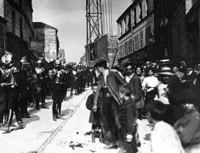




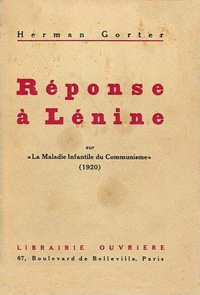


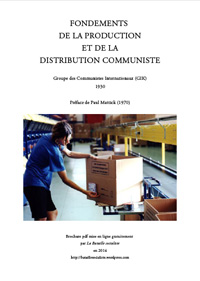




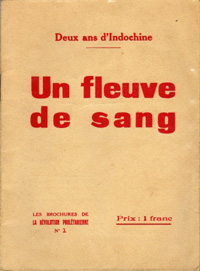


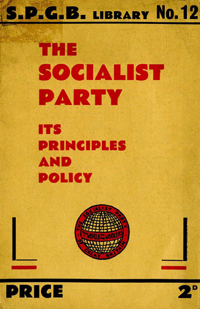
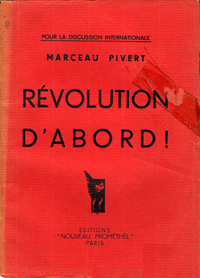





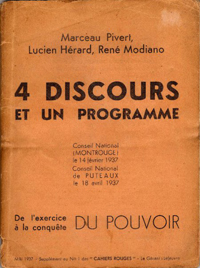



 Brochure sur l'assassinat d'A. Nin
Brochure sur l'assassinat d'A. Nin 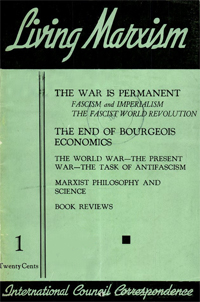
 Numéros de L'Insurgé de 1942 et 1943
Numéros de L'Insurgé de 1942 et 1943
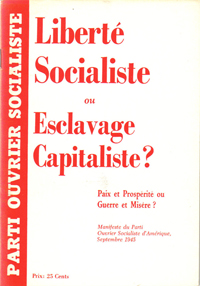

 Brochure Spartacus
Brochure Spartacus


 Mémorial de
Mémorial de 


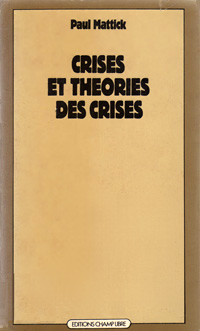


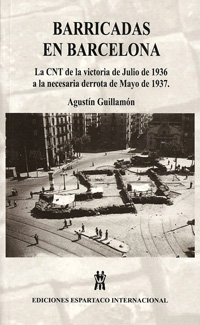

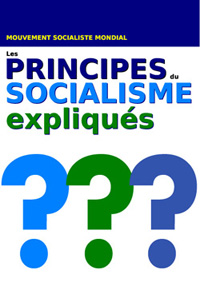
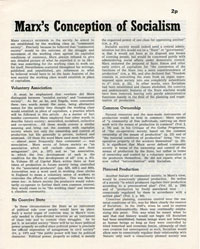













 page
page



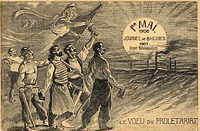

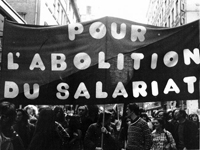
10 octobre 2009 à 11:43 |
[…] Traductions de ce texte de 1930: Fundamental Principles of Communist Production and Distribution (1) (2) [ extrait ]. Nous avons aussi publié présentation par P. Mattick de ce texte, rédigée […]
J’aimeJ’aime